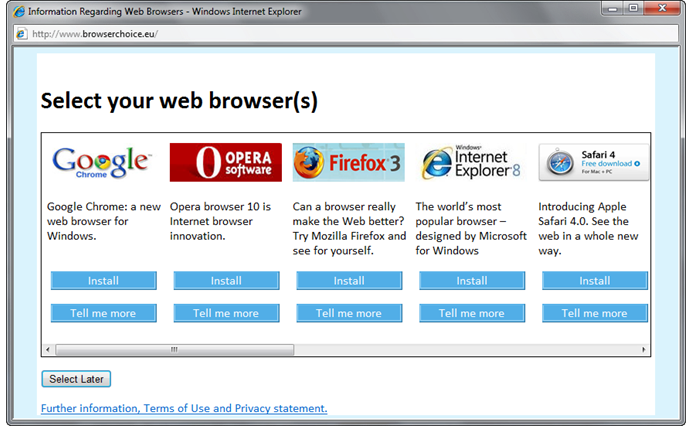Microsoft's browser bundling battle is over (for this decade, at least)

Microsoft started this past decade in the midst of a fight over whether Internet Explorer (IE) was part of Windows (in U.S. antitrust courts in the U.S. Department of Justice vs. Microsoft case). The company ended it the same way in the European Union -- but deciding this time to settle rather than fight.
On December 16, the European Commission announced it had agreed to Microsoft's concessions in the Opera vs. Microsoft case. By agreeing to offer Windows users a ballot screen of browser choices, the Softies were able to avoid fines or other EC-imposed remedies. The outcome: European PC users running XP, Vista and/or Windows 7 will be getting ballot screens, listing a total of 12 browser choices, one of which will be IE. (The top five -- IE, Firefox, Safari, Chrome and Opera -- will be listed more prominently than the other seven, AOL, Maxthon, K-Meleon, Flock, Avant Browser, Sleipnir and Slim Browser.)
Here's Microsoft's statement and documentation outlining its browser commitments, as well as what it's proposing to do to ease interoperability between Windows, Windows Server, SharePoint, Exchange and third-party products -- another arena the EC has been investigating.
From a December 16 blog post by Mozilla Foundation Chair Mitchell Baker, it sounds like Microsoft also will be eliminating any pop-up Windows which might redirect users to IE and away from alternatives. Mozilla also was against Microsoft listing the top five ballot entries alphabetically by vendor; I'm not sure so far whether that concession ended up as part of the final settlement. Update: Yes, it looks like that concession is part of the ballot, as the browser order is being generated randomly. Here's a sample of the final ballot screen:
Microsoft originally fought hard against the browser ballot -- to the point where the company almost went so far as to create a whole new Windows 7 SKU (Windows 7E) that wouldn't provide a way for users to get on the Internet and choose a browser. Happily, someone, somewhere at the company put the brakes on that idea before it went too far. Microsoft didn't need a costly, drawn-out battle that might mar the reputation of Windows 7 on its hands. As hard as it might have been for executives accustomed to battling, this time Microsoft decided it was better to switch than fight.
Many readers of this blog have been vocal critics of the browser ballot. Who doesn't know you have a choice of browsers and how to download them from the Web, many of you have asked. As I've said before: Tech savvy readers like yourselves know this, but many average consumers do not. They don't know IE is a browser and many don't know there are other choices or which companies offer them. That's why I've been a fan of the idea of a browser ballot since it was first proposed. Instead of allowing Microsoft to sit on its laurels and make occasional enhancements to its browser whenever the spirit moves it, a ballot fosters more competition -- and, I'd argue -- better browsers from Microsoft and others.
So Microsoft's browser-bundling troubles are over. For this decade. I wouldn't be surprised to see Microsoft enmeshed in yet another browser-bundling suit in the coming decade, perhaps with Google as one of the behind-the-scenes instigators. That said, given that Google is bundling its own Chrome browser into its Chrome OS, it might have a pretty flimsy case....
If I were CEO Steve Ballmer, the last ten years would make me rethink whether bundling IE with Windows is worth the continued legal risks. I'd be inclined to make a browser ballot the default on Windows PCs everywhere, not just Europe. Yes, decoupling IE from Windows would be a risky strategy, given IE's overall market share is continuing to erode (it's at 62 percent or so in Europe, according to some figures) and with more and more developers vetoing IE because it isn't WebKit-based and not compliant enough with emerging Web standards.
But if Microsoft really does believe IE is the fastest and most secure browser out there, why not give users a true choice?
